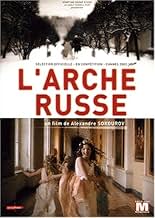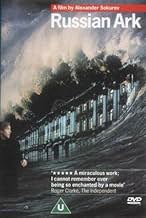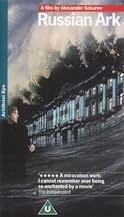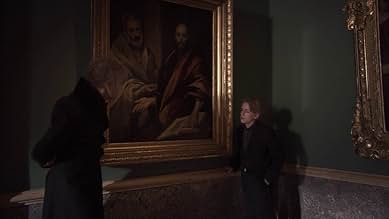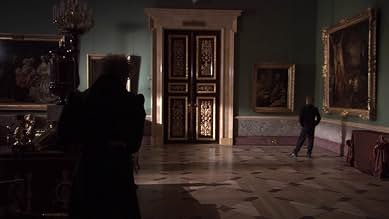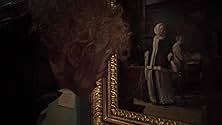Un aristocrate français du 19ème siècle, connu pour ses mémoires cinglantes sur la vie en Russie, parcourt le musée de l'Ermitage de Russie et fait la connaissance de personnalités historiqu... Tout lireUn aristocrate français du 19ème siècle, connu pour ses mémoires cinglantes sur la vie en Russie, parcourt le musée de l'Ermitage de Russie et fait la connaissance de personnalités historiques des 200 dernières années.Un aristocrate français du 19ème siècle, connu pour ses mémoires cinglantes sur la vie en Russie, parcourt le musée de l'Ermitage de Russie et fait la connaissance de personnalités historiques des 200 dernières années.
- Réalisation
- Scénario
- Casting principal
- Récompenses
- 10 victoires et 15 nominations au total
Avis à la une
For their bravura, awe-inspiring cinematic tour-de-force, director Alexander Sokurov and cinematographer Tilman Buttner take us into the famed Hermitage Museum and Winter Palace in St. Petersburg, providing us with a grand tour not only of the opulent rooms and famous artwork contained therein, but of 300 years of Russian history as well, as various vignettes involving famous people (from Peter and Catherine the Great to Nicholas and Alexandra) and events are played out within the glorious gilded walls.
`Russian Ark' is a bold and audacious project that is the cinematic equivalent of a breathlessly performed high wire juggling act. We know that one false move on the part of the actors or the cameraman, one missed cue or accident of fate could bring the whole delicately poised enterprise crashing down around them. How often, one wonders, did a perfectionist like Sukorov have to resist the temptation to yell `Cut!' to his actors and crew? It's truly amazing to see just how beautifully planned and flawlessly executed the final product turns out to be, especially the ball sequence at the end which features hundreds of dancers and spectators who are set in beautifully choreographed and constantly whirling motion. What's most remarkable is how much of a participant the camera itself is in the proceedings. Not content to stand idly by and observe the scene like some passive onlooker, the camera moves right into the center of the action, gliding in and out of the crowds with utmost grace and precision. Visually, the film is stunning, with exquisite costumes and furnishings as far as the eye can see. Indeed, `Russian Ark' is, among other things, a veritable feast for the eyes, the likes of which we have rarely seen on film before.
`Russian Ark' does have something of a `plot,' involving a narrator whom we never see, a 21st Century filmmaker we assume it's Sukorov himself - who's found himself inexplicably caught in some type of time warp and magically transported to this strange spectral world. There's also a bizarre European `ghost' figure from the unspecified past who comments - and occasionally attempts to intrude on the actions taking place around him. But these two characters are of far less interest to the audience than the aural and visual delights of the film itself.
`Russian Ark' is a wonder to behold, for it is much more than just an `exercise,' a `gimmick,' or even an `antithesis' to Eisenstein; it is a vibrant work of art that challenges the limits of its medium and reminds us of just what it is about movies that we love so much.
Director Aleksandr Sokurov is the voice of the anonymous inquisitor who accompanies nineteenth century French marquis Sergei Dreiden (Sergei Dontsov) on a breathtaking tour of the physical and spiritual Hermitage of St. Petersburg. He has made a groundbreaking, stunning film. Shot from a Steadycam in one continuous over hour-and-a-half stream, the film explores the treasures of one of the world's greatest museums. Equally, "Russian Ark" rambles, without regard for chronological order, through snatches of Russian and Soviet history, each short episode a fantastical peep into a wild, rich, often terrifying but always fascinating world.
In the nineteenth century European travellers, most often men (Charles Dickens, for example) and some women (Fanny Trollope for one) visited and wrote about the two untamed civilizations that beckoned to foreigners and promised adventure and intrigue: Russia and the United States. Count Dreiden, a not atypical Frenchman of haughty self-assurance and ample means, viewed Russians as boorish and their culture a gilt-splendored front for a nearly barbarous land. His book would not have been picked up by a publisher linked to the travel industry.
In "Russian Ark" Dreiden is more muted than he is in print but his unquestioning cynicism comes through as Sokurov captures the imagined journey in one building of a French nobleman through both his time and a future he questions without developing much understanding.
So we have both an Acoustaguide tour of a wonderful palace of culture and myriad treasures and snapshots of everyone from Catherine the Great to Nicholas and Alexandra and their children, including an adorable Anastasia, fated to be one of history's silly mysteries. Noblemen and contemporary sailors, bemedaled officers and bejeweled women, a cultured woman gallery guide and apparatchiks - they all fleet through and interact with the questioning but stolidly biased Frenchman.
How did Sokurov pull off a continuous take through over 4,200 feet of the Hermitage with a cast of many hundreds, gorgeously costumed, without a hitch? Unbelievable! That feat alone propels him into the Cinema Pantheon of Fame. At times I felt like I was drawn into the crowd, especially when they depart a dance to head for a fabulous banquet (the dance band is conducted by Valery Gergiev, the only famous - to Westerners - person in the film). And even though I knew from reviews that Sokurov pulled it off, I kept waiting for the seemingly inevitable "Cut!" following a miscue or stumble.
The hint of intrigue and menace that is so much part of Russia's past and present lurks behind an almost impressionistic front with scenes of one-dimensional gaiety almost but not entirely hiding a complex society. Sokurov teaches and teases simultaneously.
As visual splendor and directorial innovation this is one of the great films of our time. I look forward to owning it on DVD knowing that its magic can never be realized fully outside a theater.
Don't miss this one and see it more than once.
10/10.
The film begins in the dark with the narrator (apparently Sokurov) commenting about how little he sees. "My eyes are open", he says, "and yet I see nothing". He does not know where he is but apparently has just died in an accident of some kind. Is this a movie? A play?" he asks. He receives no answer except a vision of 18th century aristocrats moving slowly into the Tsar's palace. An elegant white-haired man in a black cloak (Sergey Dreiden) suddenly appears and escorts the confused narrator into the corridors of the grand palace. "Everyone knows the present, but who can remember the past", says the stranger as they walk from one ballroom to the next, witnessing great works of art as well as ghost-like presences from Russia's past. We see works by El Greco, Rubens and Van Dyck in their awesome splendor. We run into Peter the Great thrashing a general, Catherine the Great looking for the bathroom, and Nicholas II, the last Russian Tsar hosting the Great Royal Ball of 1913, the last such formal occasion of its kind.
As we enter the Great Nicholas Hall, the opulent room is filled with thousands of aristocrats dancing the mazurka in gorgeous period costumes. A full orchestra is playing in the background and young soldiers are nattily dressed in their uniforms. How beautiful it all seems and how it appears they were destined to live forever but we all know how the nasty Bolsheviki spoiled the party. Ah yes, how green was my valley then. Sokurov said he wanted to make a whole film "in one breath" and he has succeeded in simulating the breathing process, pulling us in, then moving us out as we feel the rhythm of our own life beating with the swirl of lost humanity. At the end of Russian Ark, we see the peaceful flow of a river outside the hall to which the narrator comments, "The flow is forever. Life is forever." Having completed the past, our invisible guide is now ready to move into the endless silence that is, in the phrase of the Anglican priest Thomas Kelly, "the source of all sound".
Le saviez-vous
- AnecdotesShot in a single take. The first three attempts were cut short by technical difficulties, but the fourth was successful.
- GaffesMany extras look to the camera and they quickly return to a default mark.
- Citations
The Time Traveller: Sir. Sir. A pity you're not here with me. You would understand everything. Look. The sea is all around. And we are destined to sail forever, to live forever.
- ConnexionsEdited into Spisok korabley (2008)
- Bandes originalesMazurka
(from opera "A Life For The Tsar")
Music by Mikhail Glinka
Performed by Mariinsky Theatre Orchestra
Conducted by Valery Gergiev
Meilleurs choix
- How long is Russian Ark?Alimenté par Alexa
Détails
- Date de sortie
- Pays d’origine
- Langues
- Aussi connu sous le nom de
- Russian Ark
- Lieux de tournage
- Sociétés de production
- Voir plus de crédits d'entreprise sur IMDbPro
Box-office
- Montant brut aux États-Unis et au Canada
- 3 048 997 $US
- Week-end de sortie aux États-Unis et au Canada
- 29 022 $US
- 15 déc. 2002
- Montant brut mondial
- 8 691 860 $US
- Durée
- 1h 39min(99 min)
- Couleur
- Mixage
- Rapport de forme
- 1.78 : 1







